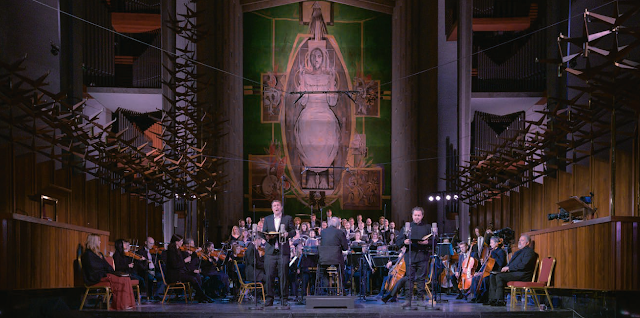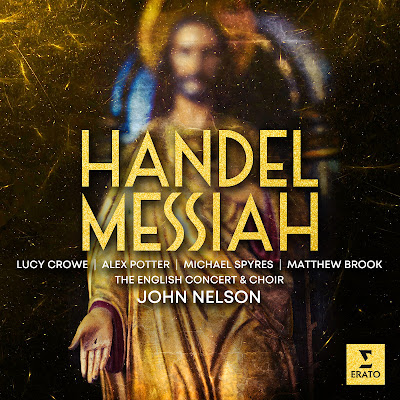Handel: Messiah; Lucy Crowe, Alex Potter, Michael Spyres, Matthew Brook, the English Concert & Choir, John Nelson; Erato
Reviewed 4 December 2023
Superb musicality and a life-time's experience from John Nelson make this a finely engaged performance, with a fantastic quartet of soloists and an appendix with eight alternative readings
Handel wrote Messiah in 1741 for performances in Dublin in 1742. Unusually for Handel, the work was written without knowing quite who the soloists would be. The enthusiastic reception in Dublin was not repeated when Handel presented the work in London in 1743 and the work was only intermittently revived until Handel's charity performances for the Foundling Hospital began in 1750. From then on, Foundling Hospital performances of Messiah were a part of the London scene, and it is to these later performances that we owe the version of Messiah generally performed today.
Handel constantly adjusted the work, revising and tweaking. For the 1749 revival the castrato Gaetano Guadagni (best known for creating the role of Orfeo in Gluck's Orfeo ed Euridice), Handel created showy arias for the singer, he was added as a fifth soloist, rather than as replacement for the alto soloist. Handel's alto soloist was always a woman, during his lifetime a man never sang 'He was despised', and similarly with one exception when boys were used, the soprano soloist was always a woman.
The 1754 Foundling Hospital performance of Messiah is the first for which detailed of the orchestral and vocal forces survive; we not only have the original parts, we have the accounts with payments for the individual singers and musicians, something we lack for Handel's own performances. It is this performance that Christopher Hogwood based his iconic recording [originally on L'Oiseau Lyre] of Messiah with the Academy of Ancient Music, and subsequent period instrument performances have often investigated particular years of Messiah from the 1741 original [receiving its first recording], the 1742 Dublin version [recorded by John Butt & the Dunedin Consort on Linn Records] right through to Guadagni's 1749 performances [recorded by Rene Jacobs on harmonia mundi].
This new recording from conductor John Nelson and The English Concert and Choir on Erato features the soloists soprano Lucy Crowe, countertenor Alex Potter, tenor Michael Spyres and bass baritone Matthew Brook.
In the pre-publicity for the recording Nelson is recorded as saying that at the age of 80, he finally felt ready to lay down a recording of 'his' Messiah. The version used is a largely a traditional one, though admittedly no traditional Messiah is quite the same as another. So, we have variants introduced during the 1740s including the more spectacular solos created for Guadagni, but where we diverge from Handel's own performances is that though we have the Guadagni solos, we only have one alto soloist so that the regular alto solos, including 'He was despised' are all sung (very finely) by Potter.
But Nelson does seem to have been fascinated by Messiah's history so there is a bonus section of eight variants, including the original 12/8 'Rejoice greatly', a selection of beautiful feet and even an alternative 'But who may abide'.
 |
| Handel: Messiah - Lucy Crowe, Alex Potter, Michael Spyres, Matthew Brook, English Concert & Choir, John Nelson - Coventry Cathedral (Photo: Jamie Gray) |
Nelson's recordings have largely been on modern instruments, including his Berlioz series from Strasbourg and the very fine recording of Handel's Semele with Kathleen Battle in the title role, a recording which uses one of the longest versions of the work on disc. Here, he is conducting the period instrument forces of the English Concert. But his approach is pretty traditional, the speeds in the overture and the subsequent arias certainly do not frighten the horses, and are largely singer friendly.
The advantage of this is that, in the choruses, we get nothing like the 'look how fast we can sing' effect that bedevils some period instrument performances. Here choruses are taken at fine, sensible speeds. Just right, in fact. The choral singing is, of course, top notch with the chorus giving us firm lines, pointed rhythms and admirable runny bits. But Nelson's approach seems to favour line and tone over text, the diction is generally adequate but certainly it is not one of those performance where the text takes primacy, as it should in oratorio.
The soloists are rather better in this respect, particular in the more recitative passages. They make a wonderfully balanced and engaging group. Lucy Crowe is a familiar quantity in this repertoire, but that does not make the engaging plangent quality of her voice any less appealing. Even in her first entry, she makes wonderful emotional sense of the recitative, and of course gets two goes at 'Rejoice' the one familiar and finely judged, the other perkily 12/8 and a complete delight. Of course, the high point for any soprano is the opening of Part Three, 'I know that my Redeemer liveth' and Crowe manages the feat of combining word and line into a plangently shaped whole. Pure magic.
Countertenor Alex Potter is introduced to us with 'But who may abide', displaying a warmly appealing sound, with a very Oxbridge-sounding combination of tone and diction and his tone hints at the great James Bowman at times. No bad model. And then in the 'Refiner's fire' we get fine passage work yet still great words. His account of 'He was despised' is well balanced, not too slow and beautifully shaped, expressive yet not too milked, thank goodness. 'Thou art gone up on high' has a fine firmness to it, and then there is a novelty, the two-countertenor version (with Rory McLeery) of beautiful feet, and the solo alto version is one of the alternatives.
At first Michael Spyres might seem a less usual choice for tenor, but there is no reason at all why a singer known for Donizetti, Bellini and Berlioz should not sing Handel and his background probably includes a fair number of bread and butter Messiahs. He makes a fine, firm tenor soloist, engaging and admirable, yet at the same time reminding us that the great John Beard sang this role whilst also singing the title roles in Samson and Jephtha. Here Spyres has that lovely combination of strength and line, with a sense that there is power under the bonnet for these bigger roles. All in all, I loved what he did, drawing us in with his opening sequence in Part One, and ending with a finally judged duet with Potter, 'O Death, where is the sting', the two voices contrasting yet balancing.
As the bass soloist, Matthew Brooke is positively on fire through the whole disc. His opening accompanied recitative has the requisite swagger along with a sense that he knows what he is talking about and that the words mean something. He varies his tone subtly throughout, colouring each word. 'The people that walked in darkness' is similarly fully engaged. Later on 'Why do the nations' has a lovely bravura swagger to it and fine passagework, and then 'The trumpet shall sound' is a brilliant highlight, with words to the fore, a performance that really means something.
The recording was made after live performances in Coventry Cathedral; many of Nelson's recordings have been made based on live performances but it is not clear whether here we have a patched together sequence of live, or recordings made after the event. Whichever, the standard is high and the sound engaging. I listened to the CD recording but there is also a DVD of the performance.
Handel: Messiah
Lucy Crowe (soprano)
Alex Potter (alto)
Michael Spyres (tenor)
Matthew Brook (bass baritone)
The English Concert & Choir
Recorded 23-25 November 2022, New St Michael's Cathedral, Coventry
ERATO 5054197741609 2CDs [84.01, 82.27] + 1 DVD
Support Planet Hugill: buy Handel's Messiah with John Nelson & The English Concert on Erato from Amazon.
Never miss out on future posts by following us
The blog is free, but I'd be delighted if you were to show your appreciation by buying me a coffee.
Elsewhere on this blog
- The Goldberg Variations Reimagined: Rachel Podger and Brecon Baroque at Kings Place - concert review
- Bach's Christmas Oratorio from Masaaki Suzuki and the Orchestra of the Age of Enlightenment - concert review
- Organ Re-born! a mini-concert series mounted in celebration of the return and rebirth of Norwich Cathedral’s organ - concert review
- The Hidden Light: composer Joanna Marsh on her triptych of pieces for the choir of St John's College, Cambridge - interview
- Early Beethoven & Verdi's only string quartet in London's oldest surviving Livery Hall - concert review
- A distinctive voice & a richly rewarding sound-world: songs by Franco Alfano from Anna Pirozzi & Emma Abbate -record review
- Handel by candle-light & a gig on Jimi Hendrix's bed: Handel Hendrix After Dark - concert review
- Captivating & fascinating: Goldberg from Syriab Trio and Trio d'Iroise, bringing together Western classical, Arabic music and Bach - record review
- A remarkable sense of energy & engagement: Wagner's Die Walküre from the London Opera Company at St John's Smith Square - opera review
- Dependent Arising: American violinist Rachel Barton Pine on combining classical and Heavy Metal on her latest concerto album -interview
- Magical textures & supple lines: Fauré's La bonne chanson, Ravel & Canteloube from Louise Alder & eleven friends at Wigmore Hall - concert review
- Home












No comments:
Post a Comment